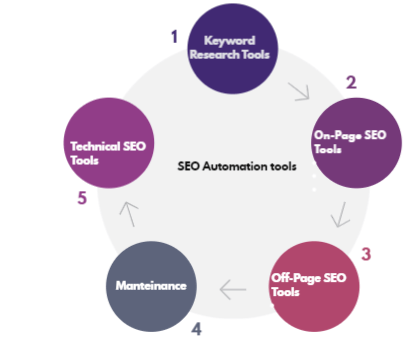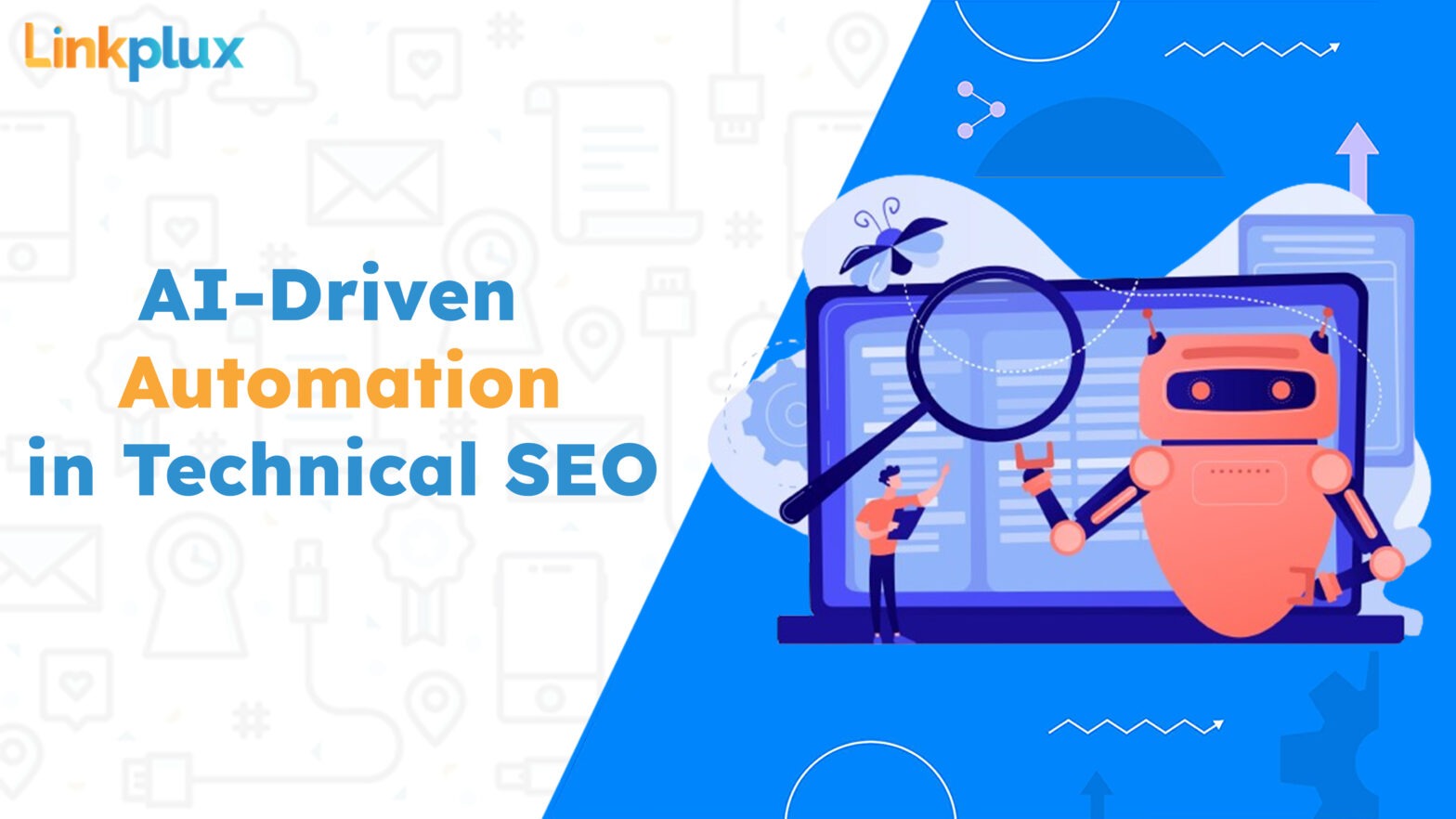AI in Technical SEO” describes how artificial intelligence (AI) is reshaping technical search engine optimization (SEO). This introduction looks at using AI algorithms and tools for website auditing, error detection, and optimization. This overview explores AI capabilities to show how businesses can improve their SEO strategies, website functionality, and online presence through intelligent automation.
SEO Automation with AI :
In the rapidly changing world of search engine optimization (SEO), SEO automation powered by artificial intelligence (AI) has emerged as a game changer. SEO Automation with AI is using AI technologies to streamline and optimize different aspects of SEO processes. This includes but is not limited to, keyword research, content optimization, technical SEO audits, link building, and performance tracking.
AI-powered tools and algorithms have transformed traditional SEO practices, allowing marketers to handle large amounts of data efficiently and make informed decisions. For example, AI-powered keyword research tools can analyze search trends, user intent, and competition to recommend high-performing keywords, saving significant time and effort over manual research methods.
Content optimization, another critical aspect of SEO, benefits significantly from AI automation. Natural language processing (NLP) algorithms can assess content quality, relevance, and readability, allowing marketers to optimize their content for search engines and users. Additionally, AI-powered content generation tools can help create engaging and relevant content on a large scale based on identified trends and user preferences.
Technical SEO audits, which involve identifying and resolving website issues that affect search engine crawling and indexing, can be significantly accelerated by AI. AI algorithms can crawl websites indefinitely, detecting errors, broken links, and other technical issues before providing actionable insights for optimization. This proactive approach ensures that websites maintain peak performance and visibility in search results.
How can AI be used in SEO?
AI can be used in SEO in various ways to enhance efficiency, effectiveness, and performance.
Here are some critical applications,
Content Optimization : AI-powered tools use user intent, search trends, and competitor content to recommend optimized keywords, headings, and content structures. Natural Language Processing (NLP) algorithms assist in creating content that appeals to users and search engines.
Keyword Research : AI algorithms analyze massive amounts of data to find relevant keywords, long-tail phrases, and semantic variations. These insights help to target the right keywords, increasing search visibility and attracting qualified traffic.
On-Page SEO : AI tools check websites for on-page SEO elements like meta tags, headings, and internal linking structures. They recommend optimizing these elements to improve crawlability, relevance, and ranking.
Technical SEO Audits : AI-powered crawlers scan websites for technical issues such as broken links, crawl errors, and duplicated content. By automating these audits, AI assists in identifying and resolving problems that affect search engine indexing and ranking.
Voice Search Optimization : Voice Search Optimization focuses on adapting website content and structure to align with the natural language queries users pose to voice-enabled devices like smart speakers and virtual assistants. This includes optimizing for conversational keywords, long-tail phrases, and local search intent. By tailoring content to match voice search patterns and providing concise, relevant answers, businesses can enhance their visibility in voice search results, improve user experience, and capture valuable organic traffic.
User Experience Enhancement : User Experience Enhancement focuses on refining website design, navigation, and functionality to ensure visitors’ seamless and satisfying experience. Through intuitive interfaces, fast loading times, and mobile responsiveness, businesses can engage users effectively, increase retention rates, and foster positive brand associations. Organizations can differentiate themselves, build customer trust, and drive conversions and long-term success by prioritizing user-centric design principles.
Is Artificial Intelligence going to replace SEO?
To conclude this burning question: will Artificial Intelligence replace seo? I don’t believe so; artificial intelligence (AI) will not wholly replace search engine optimization (SEO). While AI transforms SEO by automating tasks, providing insights, and increasing efficiency, the discipline remains multifaceted, requiring strategy, creativity, and human expertise.
Here’s why AI won’t replace SEO:
Human Creativity : SEO entails producing valuable and engaging content, determining user intent, and developing audience relationships. While AI can help with content generation and optimization, human creativity and intuition are required to create compelling content that resonates with users.
Adaptability : SEO strategies must constantly evolve to keep up with changes in search engine algorithms, user behavior, and industry trends. While AI can analyze data and predict outcomes, human SEO professionals must interpret insights, adjust strategies, and make strategic decisions based on overarching business objectives.
Complexity : SEO includes technical optimization, content strategy, link building, and user experience. While AI can automate some technical tasks, managing and integrating these elements into a cohesive SEO strategy necessitates human expertise and oversight.
User Experience : SEO is more than just ranking high in search results; it’s also about providing a smooth and enjoyable user experience. While AI can optimize technical aspects of SEO, human judgment is required to prioritize user needs and preferences, resulting in a positive experience across all touchpoints.
AI tools that are used in SEO :

AI tools for SEO (Search Engine Optimization) use artificial intelligence and machine learning algorithms to automate tasks, analyze data, and provide insights to improve website visibility and performance in search engine results pages (SERPs). Here are some critical AI tools commonly used in SEO:
SEO Automation tools :
Content Optimization Tools: AI-powered content optimization tools assess content quality, relevance, and keyword usage before recommending improvements for higher search engine rankings. Examples include Clearscope, MarketMuse, and Surfer SEO.
Keyword Research Tools :
AI-powered keyword research tools examine search trends, user intent, and competitor data to determine which keywords and phrases to target in content. Examples include SEMrush, Ahrefs, and Moz Keyword Explorer.
Technical SEO Audit Tools :
AI-powered technical SEO audit tools crawl websites for broken links, duplicate content, and page speed optimization issues. Examples include Screaming Frog, Sitebulb, and DeepCrawl.
Natural Language Processing (NLP) Tools :
NLP-powered tools assist in determining user intent behind search queries and optimizing content accordingly. BERT (Bidirectional Encoder Representations from Transformers) is an NLP algorithm used by Google to improve its understanding of natural language queries.
Backlink Analysis Tools :
AI-powered backlink analysis tools examine backlink profiles, evaluate link quality, and identify opportunities for link building and optimization. Examples include Majestic, LinkResearchTools, and CognitiveSEO.
Rank Tracking Tools :
AI-powered rank tracking tools track keyword rankings in search results and provide information on ranking fluctuations, trends, and competitor performance. Examples include SEO PowerSuite’s AccuRanker, SERPWatcher, and Rank Tracker.
Content Generation Tools :
AI-generated content tools generate content using natural language generation (NLG) algorithms from input data and parameters. While these tools are still in development, examples include GPT-3-based platforms such as OpenAI’s Codex and Copy.ai.
These artificial intelligence tools help SEO professionals and website owners with various aspects of search engine optimization, including content creation and optimization, technical SEO, and performance tracking.
AI tool integration with SEO strategies :
AI-Powered Website Audits :
AI-powered website audits employ advanced algorithms to analyze technical elements, content quality, and user experience. These audits identify issues like broken links, duplicate content, and missing meta tags, offering actionable insights for optimization. By leveraging artificial intelligence, these tools streamline the auditing process, allowing for comprehensive analysis and efficient identification of website improvement areas.
AI-driven marketing automation :
AI-driven marketing automation harnesses artificial intelligence to streamline processes, analyze customer data, and personalize campaigns. Through predictive analytics, it forecasts trends and optimizes strategies in real time for better outcomes. SEO Automation tools segment leads, prioritize prospects, and deliver targeted content to enhance conversion rates. Chatbots and virtual assistants engage customers, providing instant support and improving user experience. Additionally, AI optimizes content for search engines, boosting visibility and driving organic traffic, ultimately improving overall marketing effectiveness.
AI-driven Rank Tracking and User Experience :
AI-driven rank tracking uses artificial intelligence to track search engine rankings and provide insights for SEO optimization. Simultaneously, AI improves the user experience by analyzing website interactions, identifying problems, and suggesting solutions. Businesses that combine these approaches can improve search visibility and website performance, resulting in higher user engagement and conversion rates.
On-page SEO and Link Building :
On-page SEO and link building are two critical components of search engine optimization (SEO) that boost a website’s visibility and authority in search engine results pages (SERPs). On-page SEO is optimizing individual web pages to improve ranking and generate more relevant traffic by focusing on content, meta tags, headings, and internal linking. In contrast, link building is the process of acquiring links from other websites to your own to improve search engine rankings and authority. Businesses can improve their website’s overall SEO performance by combining effective on-page SEO tactics with strategic link-building efforts.
Conclusion :
AI-driven automation revolutionizes technical SEO, streamlining processes, resolving issues, and boosting website performance. By leveraging artificial intelligence, businesses optimize efficiently, enhance search engine rankings, and improve user experiences. This proactive approach ensures competitiveness and long-term success in the dynamic digital landscape.
Frequently asked questions :
1.How does AI-driven automation impact technical SEO practices?
Technical SEO is being modified by AI-driven automation, which effectively finds and fixes problems like duplicate content and crawl errors. Large-scale data sets are analyzed for insights, keyword research is improved, and content strategies are optimized. It also enhances the usability and accessibility of websites, which boosts organic traffic and search engine rankings.
2.What are the key benefits of implementing AI-driven automation in technical SEO?
Technical SEO can operate more accurately, efficiently, and scalable when AI-driven automation is used. Businesses can gain a competitive edge in responding to shifts in search engine algorithms and user behavior by utilizing its deeper insights brought about by sophisticated analytics and predictive capabilities.
3.Can AI-driven tools help in identifying and fixing technical SEO issues more efficiently?
Of course, AI-powered solutions are excellent at quickly detecting and fixing technical SEO problems. They precisely identify issues like crawl errors and duplicate content, quickly analyze data, and look for patterns. In addition, artificial intelligence algorithms offer optimization suggestions that improve website performance and result in more efficient search engine optimization.
4.How does AI assist in optimizing website structure and crawlability for search engines?
AI analyzes website data to find areas for improvement, which helps to optimize websites for search engines in terms of structure and crawlability. It can improve internal linking strategies based on search engine guidelines and user behavior, prioritize pages for crawling, and automatically generate XML sitemaps. Furthermore, AI algorithms can enhance site architecture, identify and correct crawl errors, and guarantee that pages are indexed and accessible. All of these features can help a website become more visible and potentially rank higher in search engine results.
5.How does AI help in analyzing and interpreting large datasets for technical SEO insights?
AI uses machine learning algorithms and natural language processing techniques to analyze and interpret large datasets for technical SEO insights. It can swiftly sort through enormous volumes of data, finding correlations, patterns, and trends that human analysts might not notice right away. From a variety of data sources, including user behavior data, website analytics, and search engine metrics, AI algorithms can extract useful insights that can be used to optimize technical SEO elements, improve website performance, and increase overall search visibility.

